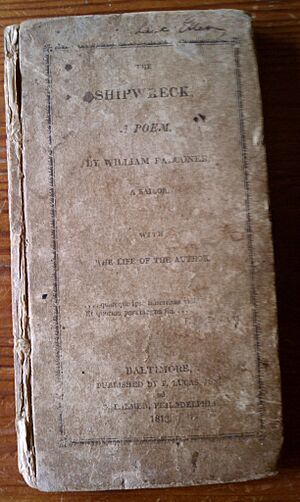William Falconer (poet) facts for kids
William Falconer (born February 21, 1732 – disappeared around January 1770) was a Scottish poet. He mostly wrote about life at sea. He also created a dictionary of words used by sailors.
Contents
A Poet's Journey
William Falconer was born in Edinburgh, Scotland. His father was a barber. He became a sailor, which helped him describe storms and ships so well in his poems.
Early Life and The Shipwreck
Falconer's most famous work is a long poem called The Shipwreck (published in 1762). This poem tells the story of a ship caught in a storm. Falconer himself had survived a shipwreck on a trip from Alexandria to Venice. Only three people, including him, survived that event.
His poem was very popular and caught the attention of the Duke of York. Because of this, Falconer was given jobs as a purser on different warships. A purser is an officer who manages supplies and money on a ship.
In 1751, Falconer wrote a poem about the death of Frederick, Prince of Wales. He also wrote poems for a magazine called Gentleman's Magazine. His famous poem, The Shipwreck, was dedicated to the Duke of York.
For a short time, Falconer was a midshipman on the Royal George. In 1763, he became the purser of a fast warship called a frigate, the Glory. While on this ship, he wrote a political satire called Demagogue. Later, in 1767, he was the purser on the Swiftsure.
In 1769, Falconer published a very important book: An Universal Dictionary of the Marine. This dictionary explained many terms used by sailors and in the navy.
Disappearance at Sea
William Falconer was a passenger on the frigate Aurora. The ship was sailing to India when it was lost at sea. He was last seen on December 24, 1769, and the ship was never found.
See also
- List of people who disappeared mysteriously at sea
 | Mary Eliza Mahoney |
 | Susie King Taylor |
 | Ida Gray |
 | Eliza Ann Grier |


